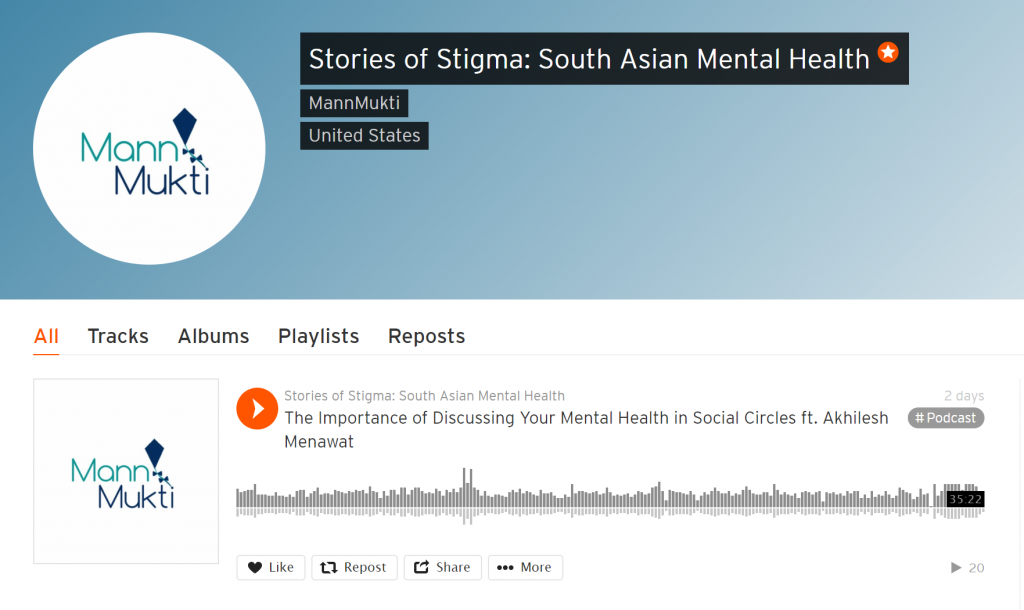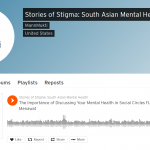
by Vaidehi Gajjar – Follow @vgajjar95
For some reason, notions of mental health and mental illness have always been hushed by a hand-over-the-mouth or a finger-to-the-lips. Mental health, mental illness, mental anything has always been attempted to be scrubbed away, as one big stain on your fancy carpet in your fancy living room. MannMukti is an organization that stops people from regarding mental health as a stain requiring riddance. MannMukti helps those with mental health issues and questions to find the help that they need without the stigma of society breathing down their necks, as well as helping those without mental health concerns to understand their friends in need.
Needless to say, talking about mental health in the South Asian community is very difficult, simply because of the mindset of the society in which we live. We live in a society where mental illness is equated with weakness by far too many. Where too many stay silent until it’s too late. But where do we draw the line? When do we put our mouths and our actions in the same place? MannMukti and I say the time is now. So what has MannMukti done to put their mouths and actions together?
[Read Related: MannMukti: New Website for South Asians Struggling with Mental Health Issues]
In order to talk about the surrounding stigma openly and without boundaries, MannMukti created a podcast series entitled, “Stories of Stigma: South Asian Mental Health,” in which the team features a different South Asian guest each episode who shares their personal story surrounding mental health. I think it’s very important to realize the effect that the podcast series has on society. As I said before, mental health is something that many people don’t think is something worth talking about, but rather something to hide. But I think through these podcasts, MannMukti is able to show people that mental health, in reality, is okay and necessary to discuss. In addition, many people also regard mental illness and mental health as fictitious excuses for the emotionally weak. The MannMukti podcast combats this by talking to real people who have immense insight on what they speak of; they talk to people with real experiences on the subject at hand. I see this effect to be positive on many people who may be too scared to speak about their own struggles, as they are able to understand that ill-mental health doesn’t make them any less than anyone else. The struggle is shared and normal.
In episode 2, Abhijith Ravinutala and Buddy Tangellamudi sit down with Salma Vir-Banks, a graduate of the University of California Berkeley, who now pursues a career as an artist. Salma explores many things through her art, including her own struggles related to mental health.
Salma begins by telling her story on how her struggle with mental health began. She talks about how it all started when she was a teenager, about 13-years-old. Her first experience with mental illness began with an eating disorder. Salma said she started out as a comfort eater, to cope with the abuse and dysfunction she dealt with through her father. She began gaining weight and other kids began picking on her. Middle school-aged Salma then thought that the best option to escape the insults of other children was to binge and purge, as well as starve herself. Along with her eating disorder issues, she also began self-harming. Stuck in a whirlwind of thoughts, Salma didn’t know what to think about who she was or what was happening to her. She was a high-achieving student in school but was internally fighting so much unspoken trauma. She braved through depression and obsessive compulsive disorder (OCD), but still finished high school like the trooper she was.
In college, Salma was also involved in abusive relationships that further troubled her – she was away from home and still dealing with her eating disorder. While Salma wanted so badly to be a part of the groups she saw around her in college (specifically groups related to feminism and strong women of color, etc.), the urge to hurt herself didn’t magically disappear. Salma acknowledges that she was being one person around these groups, but another when she kept going back to the abusive relationship, while still fighting her eating disorder. She said that she felt like the values she had didn’t match her actions. All in all, Salma lost herself in the crowd that was the world. She felt like she didn’t belong to such groups because of the thoughts and feelings she was experiencing.
[Read Related: It’s No Secret: Social Anxiety in South Asian University Communities is Real]
I think Salma makes a very good point when she talks about how there was a discord between the groups she was participating in and the internal conflict that she experienced away from those groups. She talked about how she didn’t feel entitled to be part of those groups, as well as how she didn’t belong because she was struggling with so much. And she makes one very important observation. She said that being a part of these groups and fighting her own inner demons didn’t mean that she had to be perfect. She could be flawed and STILL be a strong woman of color or a strong feminist.
Salma continued to be a warrior, but her drug and alcohol abuse landed her in psychiatric care many times in the Bay Area, as well as in trouble with law enforcement. She didn’t realize that what she was doing wasn’t normal or healthy, and she just saw herself as an overall bad person. She would see her friends succeeding in school and in their personal lives. The constant thought that would play in her head,
“I’m the problem here; I’m what is wrong.”
Salma’s parents soon rescued her from Berkeley and she returned to Los Angeles to be sent back to the same woman who treated her eating disorder in high school. Taking baby steps, Salma combatted all her demons, getting treatment for her bulimia and her drug addiction.
Salma’s story is not only compelling and brave, but also truly honest. Too often in life, we try to sugarcoat our bad moments and downplay them as much as we can. But, through this episode, I heard from a strong woman who didn’t try to cover up her bad moments and act like they were no big deal. In fact, I think Salma emphasized her most terrible moments for the audience to hear and know about. And I think that, in itself, takes a great amount of courage. I think that is a very important aspect of mental health. While it is important to look for positives in a sea of negatives, the negatives need to be recognized so that there can be more positives than negatives. Salma’s ability to stand up and say, “Yes, I have had a difficult journey,” serves as an example to those who are secretly struggling. Her honesty lets people know that their similar struggles aren’t fictitious. They’re not being over dramatic, emotionally weak, or stupid. Her honesty lets people know that being flawed is okay and speaking up is even more so okay.
[Read Related: Mental Health on College Campuses: It’s a Luxury and Not a Right to be Okay]
Our society has trained us to be afraid of the words “mental illness,” causing us to run from the truth that mental illness does indeed exist and only furthering our problems. Salma said that calling mental illness what it is, and recognizing what it does, is one of the first things that needs to be done on the path to eradicating it. And I agree with her. There is no way you can get rid of something without acknowledging that it exists. We need to stop being scared of strong words, ones that bring to light the messy parts of a person. Salma actually compares it to looking through a Facebook
We need to stop being scared of strong words, ones that bring to light the messy parts of a person. Salma actually compares the process to looking through a Facebook feed and seeing post after post that is happy and negativity-free. That’s not reality. She says she wants to see where people struggle, where people fall. And this is the attitude we so desperately need in today’s world – one that, eventually, isn’t afraid to say “mental illness” and take steps to eradicate it. Salma further points out that saying it humanizes it – ensuring that mental illness isn’t just reduced to a monetary experience or gain in which an individual becomes another file number or statistic.
Salma’s candidness in this interview is something we need so much more of in today’s world and society. Her fearlessness shows that, despite a very difficult journey, it is possible to bounce back. Healing is possible, but only if we speak up and make others aware that it is okay to speak up.
So go ahead. What are you waiting for? The time to #SpeakUp is NOW.
To learn more about MannMukti, check out their website here and their podcast episodes on SoundCloud. Get to know Salma and her work via her we bsite and donate to her GoFundMe page to support her cause.
bsite and donate to her GoFundMe page to support her cause.
 Vaidehi Gajjar is a college student currently studying biology at the University of South Carolina. She is another brown girl dreaming, exploring, and writing her way through life. She doesn’t do it for the fame, but for the freedom. Follow her down this road called life and join the adventure!
Vaidehi Gajjar is a college student currently studying biology at the University of South Carolina. She is another brown girl dreaming, exploring, and writing her way through life. She doesn’t do it for the fame, but for the freedom. Follow her down this road called life and join the adventure!




